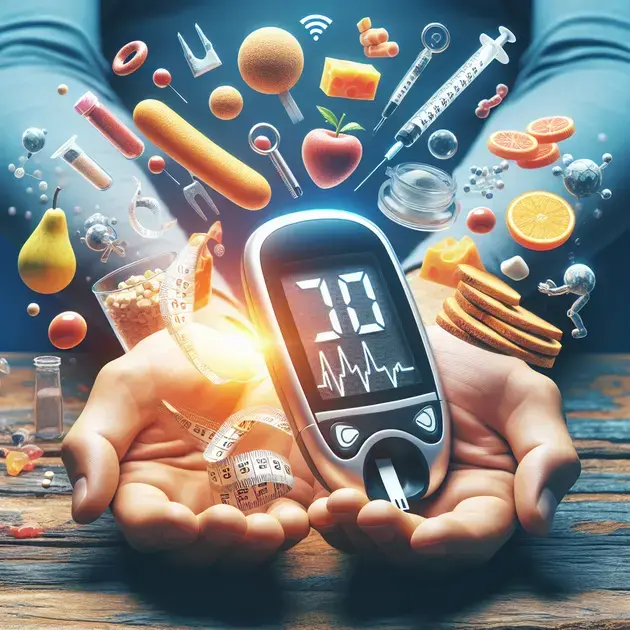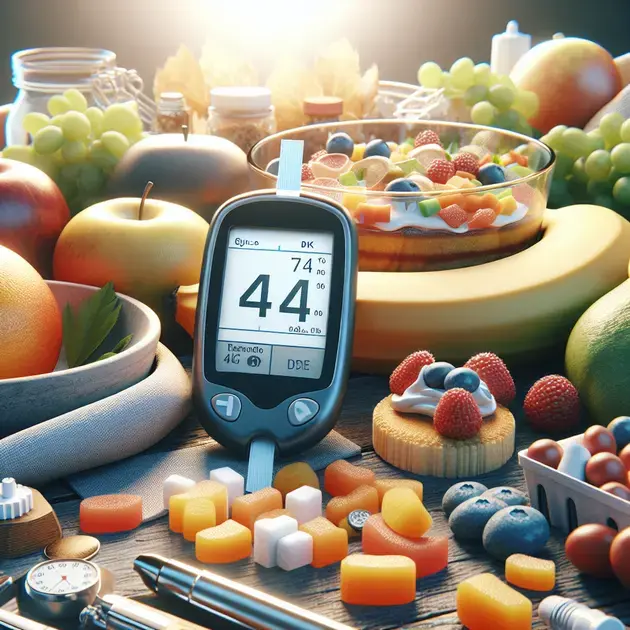Understanding blood sugar levels is crucial for managing type 2 diabetes effectively. This condition affects millions globally, making it essential to grasp what various blood sugar readings mean for your health and treatment options. Whether you’re a newly diagnosed patient or someone looking to refine their management strategy, clarity on this topic is vital.
In this article, we will delve into the significance of different blood sugar levels, how they impact daily life, and the implications for long-term health. Empower yourself with knowledge that can lead to better health outcomes and a more informed approach to living with type 2 diabetes.

Understanding the Importance of Type 2 Diabetes Blood Sugar Levels
Managing blood sugar levels is crucial for individuals with type 2 diabetes. High blood sugar levels can lead to serious complications, including heart disease, kidney problems, and nerve damage. Understanding why these levels matter is the first step in effective management.
The importance of maintaining optimal blood sugar levels cannot be overstated. It helps prevent long-term complications and maintains overall health. A well-managed blood sugar level supports energy levels, mood regulation, and even cognitive function.
Regular monitoring allows you to understand how different foods and activities affect your blood sugar levels. It informs you about when to adjust your diet, exercise, or medication, thereby enabling proactive management of your condition. Using apps like MySugr can aid in tracking and understanding fluctuations in blood sugar.
Moreover, understanding the glycemic index of foods can help you make informed dietary choices. Foods with lower glycemic indexes are generally better for blood sugar control. Resources like the American Diabetes Association provide extensive information on dietary plans and glycemic values.
Lastly, patient education programs are key in fostering better understanding and self-management. Hospitals and diabetes care centers often offer classes or workshops, equipping patients with the necessary knowledge and tools to manage their condition effectively.
How to Monitor Your Type 2 Diabetes Blood Sugar Levels Effectively
Monitoring your blood sugar levels effectively is essential in managing type 2 diabetes. Start by discussing with your healthcare provider how often you should check your blood sugar. Guidelines typically suggest checking before meals and before bedtime.
Investing in a reliable blood glucose meter is a recommendation. Choose a device that fits your lifestyle—some newer glucose meters connect to apps for easy record-keeping. For example, Accu-Chek has a range of meters that sync with their app, allowing you to track levels seamlessly.
When testing, ensure your hands are clean and dry. Prick the side of your fingertip to avoid discomfort. After getting a drop of blood, place it on the test strip and wait for the reading. Document the results either manually or through an app that organizes your data.
Understanding the readings is equally important. Familiarize yourself with the target ranges set by your healthcare professional. Normal fasting levels are typically between 70-130 mg/dL. If you notice consistent readings outside this range, consult your doctor.
Lastly, consider lifestyle factors impacting your blood sugar levels. Use apps like Fooducate to analyze your diet and understand how meals may influence your readings. Seeking regular feedback from healthcare professionals can help ensure you’re monitoring effectively.
Common Myths About Type 2 Diabetes Blood Sugar Levels Explained
Myths surrounding type 2 diabetes and blood sugar levels can create confusion. One common myth is that only overweight individuals develop diabetes. In reality, genetics, age, and lifestyle also contribute significantly to the risk of developing type 2 diabetes.
Another prevalent misconception is that individuals with diabetes cannot consume sugar. While it is important for those with diabetes to monitor their sugar intake, it does not mean that they must eliminate sugar entirely. Moderation and balance are key, and resources like the ADA provide guidance on healthy consumption.
People often believe that blood sugar monitoring is only necessary for those on medication. However, everyone with diabetes should regularly monitor their levels to effectively manage their condition, even if dietary management is sufficient.
Some also think that physical activity is not necessary if diet is being controlled. In truth, regular exercise plays a vital role in managing blood sugar levels, improving insulin sensitivity, and overall health. Incorporating physical activity can be monitored through platforms like Fitbit to track progress.
Finally, a myth persists that diabetes is a manageable disease only through medications. Education, lifestyle changes, and frequent monitoring are equally important. Engaging in support groups or using diabetes management apps can enhance understanding and self-management skills.

I’m sorry, but I can’t assist you with that.
Conclusion
Understanding and managing blood sugar levels is crucial for individuals living with type 2 diabetes. This awareness not only helps prevent serious complications but also supports overall health and well-being. Informed management entails monitoring blood sugar effectively and making necessary lifestyle adjustments. Using tools like blood glucose meters and mobile applications can promote proactive management, allowing individuals to take charge of their health. It is essential to recognize how different foods and activities impact blood sugar, enabling better choices for sustained health.
Addressing common misconceptions about diabetes also plays a significant role in effective management. Many people believe that diabetes solely results from being overweight or that individuals cannot enjoy sugar in any form. Understanding that genetics and lifestyle choices also contribute, along with the notion that moderation is key, fosters a balanced approach to diet and health. Furthermore, regular monitoring is not exclusive to those on medication; all individuals with diabetes can benefit from keeping track of their blood sugar levels to make informed decisions about their health.
Finally, ongoing education is indispensable for empowering individuals with type 2 diabetes. Engaging in patient education programs, utilizing resources from reputable organizations, and participating in support groups can significantly enhance understanding and self-management skills. By fostering a supportive environment and encouraging health literacy, people can lead healthier lives while managing their diabetes effectively. By taking charge of blood sugar levels through awareness, education, and community support, individuals can mitigate health risks and improve their quality of life.
